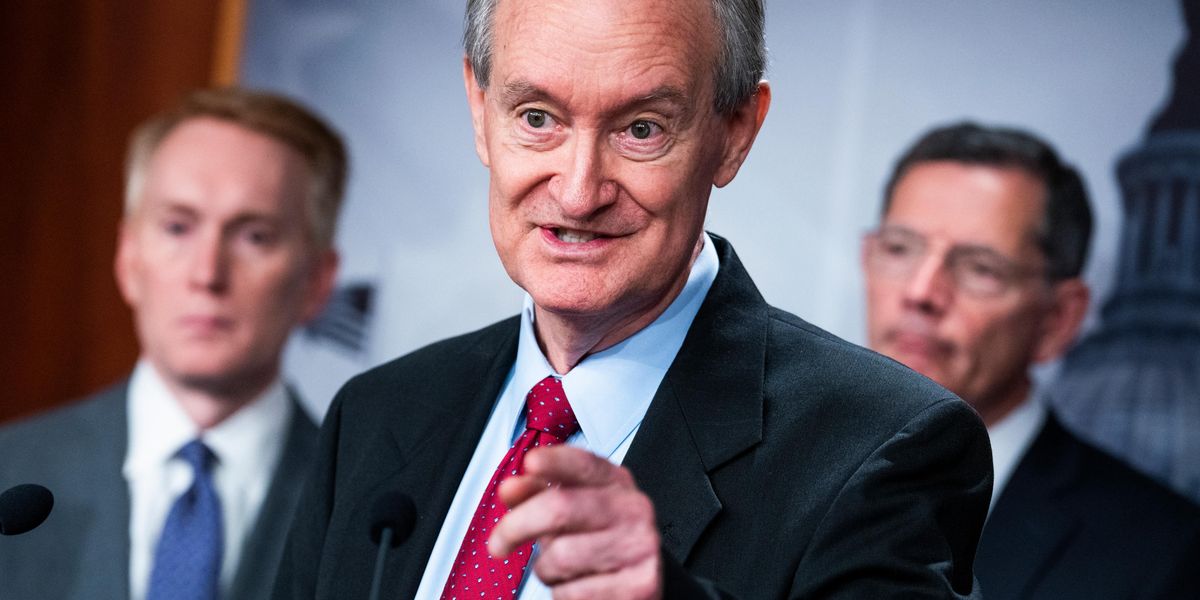
In 2018, ignoring the vocal warnings of experts and advocacy groups, the then-Republican-controlled Congress passed legislation that weakened post-financial crisis regulations for banks with between $50 billion and $250 billion in assets, sparking fears of systemically risky failures and more taxpayer bailouts.
Silicon Valley Bank (SVB), the California-based firm that collapsed on Friday, controlled an estimated $212 billion, leading analysts and lawmakers to argue that the 2018 law made the institution's market-rattling failure and resulting federal takeover more likely.
Sen. Elizabeth Warren (D-Mass.), who was an outspoken opponent of the deregulatory measure, said in a statement Friday that "President Trump and congressional Republicans' decision to roll back Dodd-Frank's 'too big to fail' rules for banks like SVB—reducing both oversight and capital requirements—contributed to a costly collapse."
But the GOP wasn't alone in its support for Sen. Mike Crapo's (R-Idaho) Economic Growth, Regulatory Relief, and Consumer Protection Act, which critics dubbed the Bank Lobbyist Act.
As Warren noted as the bill was flying through Congress, a number of Democrats—including Sens. Mark Warner (D-Va.), Joe Manchin (D-W.Va.), and Jon Tester (D-Mont.)—were integral to the legislation's passage, which led almost immediately to more bank consolidation.
Prior to the enactment of the Crapo bill, which then-President Donald Trump signed into law on May 24, 2018, banks with more than $50 billion in assets were subject to enhanced liquidity mandates and more frequent stress tests aimed at ensuring they could weather economic turmoil.
The 2018 law raised the threshold for the more stringent regulations to $250 billion or higher, a gift to banks like SVB that had been working for years to gut post-crisis regulations implemented under the Dodd-Frank Act of 2010.
As The Leverreported Friday, SVB specifically pushed Congress in 2015 to hike the regulatory threshold to $250 billion, with the bank's president touting its "strong risk management practices."
"Three years later—after the bank spent more than half a million dollars on federal lobbying—lawmakers obliged," the outlet noted.
The collapse of SVB, a major lender to tech startups, was the second-largest bank failure in U.S. history and the biggest since the 2008 crisis. SVB's failure came days after it announced it sold $21 billion worth of bonds at a substantial loss, triggering fears about the firm's health and a run on the bank that was intensified by venture capitalists' calls for startups to pull their money.
The bank's last-ditch efforts to raise capital and find a buyer failed, leading regulators to seize its assets and begin efforts to make depositors whole. (SVB reportedly paid out bonuses to U.S. employees just hours before federal regulators took over.)
The American Prospect's David Dayen noted that "because the depositors holding the bag at SVB are Very Important People, there's going to be intense pressure for a bailout."
"Hedge fund titan Bill Ackman is already calling for one," Dayen observed. "Larry Summers told Bloomberg that the financial system should be fine, as long as depositors get every penny of their money back, which would be a $150 billion bailout."
"Contagion, likely more bank failures, and various bailouts are almost certainly coming."
In a statement on Saturday, Liz Zelnick of the watchdog group Accountable.US said that "this mess was left behind by congressional Republicans and the Trump administration, who were too deep in the big banks' pocket to care about the consequences of gutting financial industry oversight."
"The chickens came home to roost this week in the Republican war against Wall Street reform and consumer financial protections," Zelnick continued. "This predictable disaster should give serious pause to the current MAGA House majority who are pursuing further rollbacks of consumer financial protections after taking money hand over fist from Wall Street banks—but don't count on it."
Some expert observers were quick to voice concern that SVB's collapse is just the start of broader chaos in the financial industry and the overall economy.
Dennis Kelleher, the president of Better Markets, warned that the fall of SVB "is going to cause contagion and almost certainly more bank failures," noting that the Federal Reserve's rapid and large interest rate increases left many financial institutions without "time to reposition their balance sheets and portfolios."
"That's why SVB is just the beginning," Kelleher argued. "Contagion, likely more bank failures, and various bailouts are almost certainly coming. While the immediate financial stability threats will materialize or be addressed, the underlying fundamental problems caused in large part by the Fed will remain and likely get worse."
"The Fed's actions to fight increasing inflation will need to be materially adjusted, which it should be anyway because inflation is driven by many factors that are beyond the Fed's control," he said. "Causing financial instability and a recession (of any depth and length) while missing the mark on inflation should cause a fundamental rethinking of the Fed's powers, authorities, and role."
This content originally appeared on Common Dreams and was authored by Jake Johnson.
Jake Johnson | Radio Free (2023-03-12T11:36:28+00:00) Trump-Era Deregulation Deemed a Key Culprit in the Failure of Silicon Valley Bank. Retrieved from https://www.radiofree.org/2023/03/12/trump-era-deregulation-deemed-a-key-culprit-in-the-failure-of-silicon-valley-bank/
Please log in to upload a file.
There are no updates yet.
Click the Upload button above to add an update.